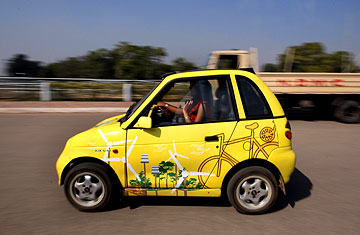
Members of the Indian Youth Climate Network drive Reva, a low-cost electric car, in New Delhi
At a time when almost every carmaker in the world is looking at making environmentally friendly vehicles, a little-known Indian company is jumping the queue by ramping up production of a low-cost electric car called the Reva.
Family-owned Reva Electric Car is building a new factory 25 miles (40 km) south of its Bangalore headquarters to mass-produce the Reva hatchback, a two-passenger city car priced at little over $12,000 that the company has been selling in India and Europe since 2001. When production begins next January, the new factory will be the world's largest for low-cost electric cars; annual capacity is expected to hit 30,000 cars within three years. "The opportunity today is very high," says Chetan Maini, Reva's vice chairman and chief technology officer.
So are the risks. Reva faces a growing list of potential competitors that plan to launch all-electric and plug-in hybrid vehicles over the next several years. GM's Chevy Volt is expected to debut in the U.S. in 2010; BMW says it will test-market an electric car in Britain and other countries later this year; while Renault-Nissan plans to make an electric car by 2012. A Frost & Sullivan study reckons that by 2020, at least 15% of all new cars sold will be electric.
But electric cars now on the drawing boards of established automakers are likely to cost more than $20,000, limiting their potential customer base to well-heeled drivers in wealthier countries. The sticker price of GM's Volt could be as high as $40,000.
The Indian company, however, aims to leverage low production costs to build simple, cheap vehicles and sell them in India, Europe and, within five years, the U.S. The Reva, branded the G-Wiz in Europe, costs about $12,200 there and about $7,000 in India. The pint-size commuter vehicles are powered by lead-acid batteries, which provide about 50 miles (80 km) of driving per charge. Top speed is about 50 m.p.h.
The cars haven't exactly taken the world by storm. Reva — which has received venture capital from Draper Fisher Jurveston, the Global Environment Fund and Mellon HBV Master Global Event Drive Fund — has sold only 3,000 cars over the past eight years. Half of those have been exported to Europe, mainly to London.
But Reva officials say they are improving their cars and plan to sell 8,000 vehicles next year after the new factory opens. In May, the company began equipping Revas with more-powerful lithium-ion batteries that increase range to 75 miles (120 km). A new model with sportier looks and upgraded electronics is expected to be launched by 2010.
Despite Reva's relatively low cost, consumers may not be convinced, especially in India, that the car can compete against similarly priced gasoline-powered family sedans. "Reva is yet to hit the price-performance equation," says Mohit Arora, senior director for India for J.D. Power market research. According to Pawan Goenka, president of Mahindra & Mahindra's automotive business in Mumbai, "The challenge is to make the economics work in a price-sensitive Indian market." For electric cars, "performance and range are major bottlenecks," he says.
Maini, who as a student at the University of Michigan in 1990 built a solar-powered electric car, says he aims to "sell at price parity with conventional cars," a goal that will be easier to reach if production and sales volumes are increased.
Reva may have one factor going for it: "It has a first-mover advantage," says Hormazd Sorabjee, editor of Mumbai-based AutoCar magazine. He adds that the Reva could become "the Nano of electric cars," referring to the world's cheapest car, the Tata Nano, which sells for about $2,000. But that mantle may not have time to stick. India's Tata Motors, in partnership with the Norwegian electric-car research-and-development firm Miljoebil Grenland, plans to launch an all-electric version of the Nano in Norway early next year.
